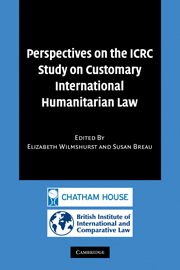Book contents
- Frontmatter
- Contents
- Preface
- List of contributors
- Table of cases
- Table of treaties and other instruments
- Abbreviations
- Part 1 Setting the scene: Theoretical perspectives on international law in the ICRC Study
- 1 The methodological framework of the Study
- 2 The approach to customary international law in the Study
- 3 Other areas of customary law in relation to the Study
- Part 2 The status of conflict and combatants: The ICRC Study
- Part 3 Commentary on selected Rules from the ICRC Study
- Part 4 Conclusions
- Index
2 - The approach to customary international law in the Study
Published online by Cambridge University Press: 09 July 2009
- Frontmatter
- Contents
- Preface
- List of contributors
- Table of cases
- Table of treaties and other instruments
- Abbreviations
- Part 1 Setting the scene: Theoretical perspectives on international law in the ICRC Study
- 1 The methodological framework of the Study
- 2 The approach to customary international law in the Study
- 3 Other areas of customary law in relation to the Study
- Part 2 The status of conflict and combatants: The ICRC Study
- Part 3 Commentary on selected Rules from the ICRC Study
- Part 4 Conclusions
- Index
Summary
Introduction
The function of this chapter is not to evaluate the substantive merits of the customary rules formulated in the Study on customary international humanitarian law applicable in international and non-international armed conflicts. Rather it aims to evaluate the methodology underpinning it – in particular, the approach adopted to the question of custom formation – in order that its conceptual foundations may be tested and appraised. The structure of this chapter is quite straightforward. It starts by raising some general considerations regarding the reduction of customary law to a written text, essentially issues associated with the process of codification. A brief account of the methodology employed in the Study is then made in order to lay the basis for its evaluation. One of the principal questions addressed is whether the Study's methodology is as traditional as it claims to be: this necessitates an examination of the role of treaty practice in custom formation and the question of persistent objection. The final section is a critical appraisal of some aspects of the practice invoked by the Study. At the outset, however, it must be emphasised that a critical scrutiny of the Study's methodology does not necessarily undermine the validity of the substantive conclusions reached.
The question of codification
Perhaps the obvious analogies to the Study are the Harvard Drafts of the 1920s and 1930s and the US Restatement of Foreign Relations Law.
- Type
- Chapter
- Information
- Publisher: Cambridge University PressPrint publication year: 2007
- 2
- Cited by



